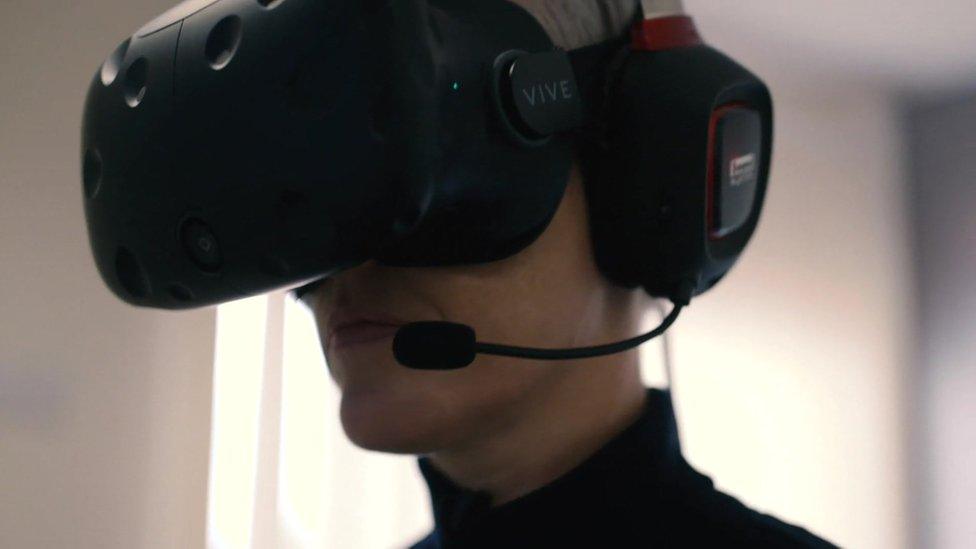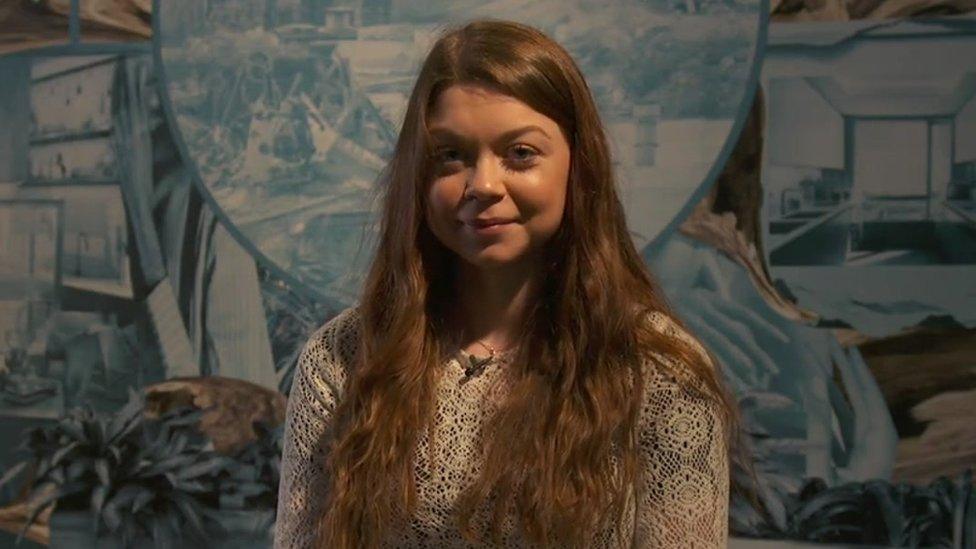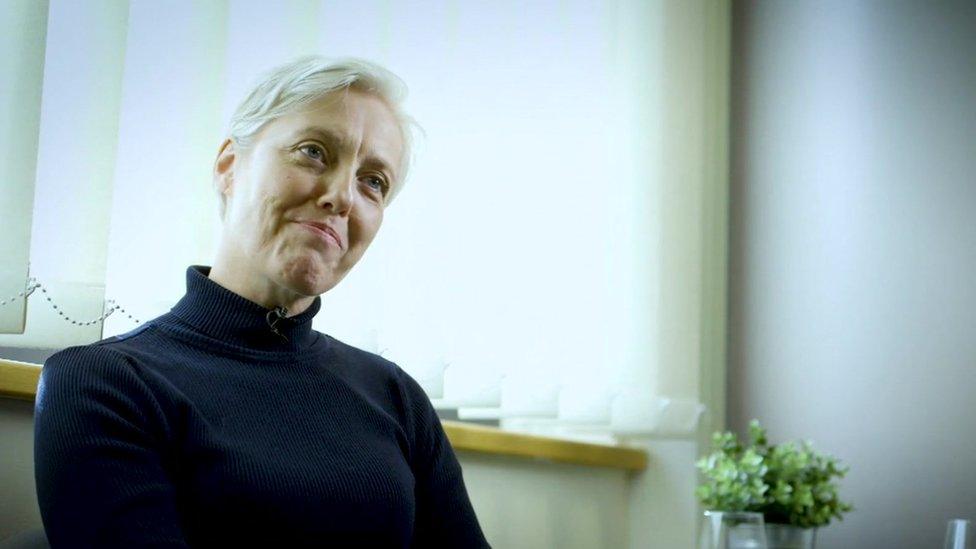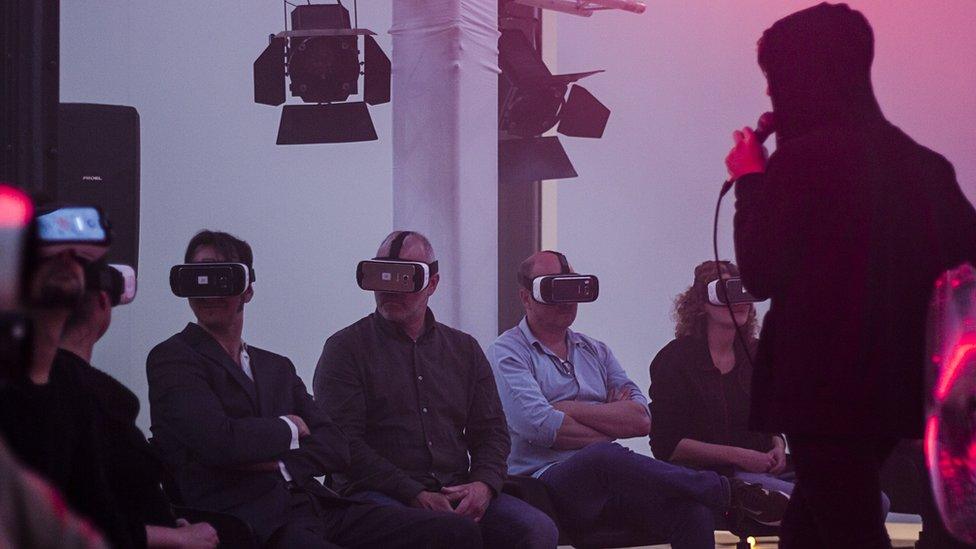Could virtual reality treat anxiety?
- Published

Liz says her fear of heights was beginning to take over her life
One in four people will experience some sort of mental health problem this year. Could virtual-reality programmes help to deal with the increased demand for treatment?
Standing on the building's 10th floor, you look down into the atrium, dizzyingly far below with just a very low barrier for protection. You then move out over the space on a platform to pick apples from a branch.
It's enough to make most people's stomach flip - but this virtual-reality (VR) programme is designed to help conquer a fear of heights.
Completing the programme is Liz Willits, who says her phobia was making her feel "very tense and jumpy" and starting to take over her life.
"Certain height situations made me feel not just like I might fall over the edge, but that I might voluntarily tip over the edge, which is a very unnerving feeling," she explains. "I didn't trust myself with heights any more."
Can virtual reality cure a fear of heights?
The programme is being developed by clinical psychologist Dr Daniel Freeman, who says there's "something beautiful" about how VR works.
"People know it's not real so they try things they've not done before or for a long time, but mind and body does behave as if it's in the real world," he explains.
"And what they are doing is learning a new memory, in Liz's case about safety around heights. And that memory of safety is replacing and helping diminish the fear memory that she had."
Body swapping

Emily has anxiety that can make ordinary social tasks such as ordering a coffee difficult
But could machines ever replace a human when treating more complex conditions such as anxiety and depression?
Another programme under development simulates a therapist's office. It uses a popular psychological technique called body swapping, in a virtual self-help therapy.
Using the simulator is Emily, who has severe social anxiety, meaning she finds daily interactions such as ordering a coffee or getting a book out of the library difficult.
"I get quite hot and quite flushed and flustered, my breathing gets quicker and then suddenly everything spills over," she says.
First Emily explains her condition to a virtual therapist - a man with a beard - in the virtual office. She then swaps places and becomes the therapist. First she listens to her avatar relay the problem she's just spoken about - and it's then her job to counsel herself.
Emily is trialling VR that allows her to become her own therapist
She asks "herself" if she has tried any methods to calm down, such as focusing on her breathing, and if she has tried to find the cause of the anxiety. She then swaps back into her own body ready to hear that advice spoken back to her by the therapist.
Emily says that knowing it was actually her speaking made it less helpful than the traditional therapy she's had.
"But it's reassuring too, a bit of a self mantra, something you were saying to someone else could actually be useful and you could take it on board," she adds.
But she says it's hard to compare with treatment from a trained professional who knows the best techniques for a particular problem.
Powerful effect
Clinical psychologist Dr Nihara Krause said virtual-reality body swapping could be useful as a tool to accompany traditional treatment - but she has concerns about it being used on its own.
"It assumes that the person first of all has got the ability to put themselves in someone else's position, which isn't always very easy," she says.
"The second assumption is that people have the verbal ability to be able to express something objectively, which again for some people isn't very easy. So I would have concerns about somebody doing it on their own."

Since completing the programme Liz has visited a treetop adventure park with her son
It is being developed by computer scientist Mel Slater, who says although it is still early days, the software has huge potential.
"We know there is a crisis in mental health and we know people have to wait a long time for appointments for things that can be fairly mild but over time become much, much, worse. And maybe this could be a stopgap before they see a real therapist."
Meanwhile, Liz has completed her course and it's had a powerful affect. Afterwards she put herself in positions where she had to face heights in real life - feeling confident enough to visit treetop adventure park Go Ape with her son.
"It was amazing. You're crossing bridges and there's great gaps in the steps... I was able to look down, it was liberating," she says.
"I feel it's good to show my son that a fear you already have, you can get over if you really put your mind to it."
The phobia simulator will now be trialled on 100 people. Once it has been fully tested Dr Freeman hopes it can be used in clinical settings and even in people's homes without a therapist present.
"Some people are nervous about therapists being replaced, but we think VR can aid therapists, and more importantly aid so many more people to get the psychological advice they need," he says.
"If we're going to radically increase the numbers of psychological treatments we're going to need technologies like VR."
Watch the Victoria Derbyshire programme on weekdays between 09:00 and 11:00 on BBC Two and the BBC News Channel.
- Published29 August 2017

- Published6 July 2017
